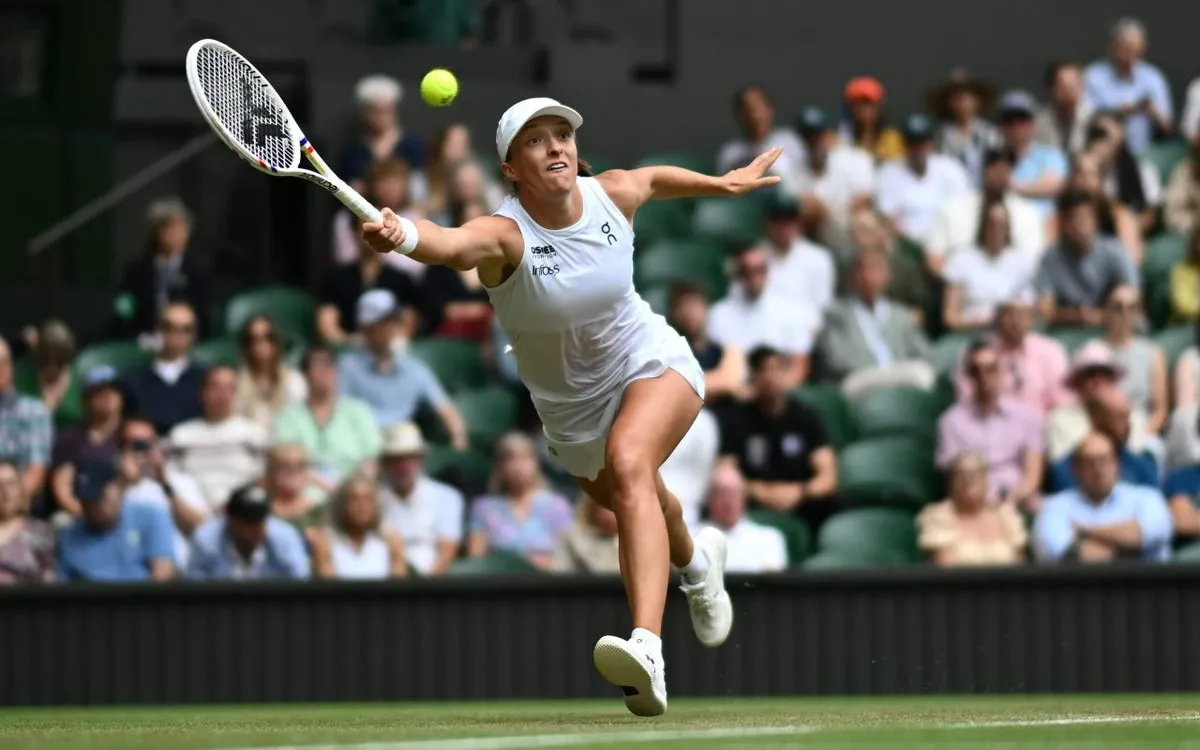
The renowned All England Club in London witnessed a remarkable display of tennis on Monday, as Ben Shelton showcased his incredible skills, particularly emphasizing his returns. In a thrilling fourth-round match against Lorenzo Sonego, Shelton's game took a pivotal turn during the intense third-set tiebreak. Sonego, known for his powerful serves, unleashed a blistering 129 mph serve aimed at Shelton's forehand. In a stunning display of skill, Shelton responded with a powerful forehand down the line that landed right on the baseline, leaving Sonego with no time to react.
After a hard-fought battle, Shelton emerged victorious with a score of 3-6, 6-1, 7-6(1), 7-5, securing his place in the quarterfinals of Wimbledon for the first time in his career. “I want to be an elite returner,” Shelton expressed after the match, acknowledging the significant progress he has made since starting his professional journey. “I’m certainly not there yet, but I’m much better than I was when I started out on tour.” His words resonate with the importance of being a strong returner, particularly at prestigious tournaments like Wimbledon.
While having a powerful serve is an asset at Wimbledon, the ability to effectively return serves is what distinguishes the great players from the merely good. Historically, players like John Isner have demonstrated the significance of this skill, reaching the semifinals in 2018, yet failing to replicate that success in subsequent years. The current state of men's tennis emphasizes that a big serve alone is insufficient; players must complement it with a strong return game to succeed.
This year's tournament featured a mix of powerful servers, but Taylor Fritz stood out by mastering the art of returning. He faced two of the biggest servers, Giovanni Mpetshi Perricard and Gabriel Diallo, in the first two rounds and spent considerable practice time refining his return techniques. “Don’t be afraid to stand in,” Fritz advised, emphasizing the importance of taking control of the point by blocking or chipping the ball back effectively.
Grass courts present unique challenges that require players to adapt their return strategies. For instance, Iga Świątek, a five-time Grand Slam champion, has adopted a patient approach this year, focusing on making smart decisions rather than aggressively attacking serves. Despite only hitting four return winners in her first four matches, she has managed to win nearly 40 percent of the points on her opponent’s serve, demonstrating the effectiveness of her method.
In her third-round match against Danielle Collins, Świątek averaged serves of 118 mph, utilizing body serves to disrupt Collins’ return strategy. Collins herself acknowledged the importance of chipping returns to give herself more time and force her opponents to think, highlighting a growing trend among players who prioritize consistency over power.
The current Wimbledon features several players who excel at returning, with Jannik Sinner leading the men’s field by successfully returning 78 percent of his serves. Novak Djokovic follows closely, achieving an impressive 80 percent return rate with 12 return winners to his name. These statistics underscore the necessity of strong return games in today’s tennis landscape, as players increasingly rely on their ability to capitalize on opponents' serves.
Among the women, Emma Navarro has also surprised many by advancing to the second week of Wimbledon despite initial skepticism regarding her grass court skills. Her game plan involves taking serves closer to the baseline and using the grass to her advantage, resulting in a remarkable 76 percent return rate.
Ben Shelton's journey through this year's Wimbledon has been nothing short of impressive. He has transformed his game, winning the majority of points on both his opponents' first and second serves. With 31 percent of points won on first serves and 60 percent on second serves, Shelton has proven to be a formidable opponent, maintaining an impressive 94 percent success rate in his service games.
“For me, the game slows down and gets a lot simpler when I’m serving a high first-serve percentage,” Shelton remarked after his victory. His ability to return effectively has become a significant asset, making it challenging for opponents to find their rhythm. As he continues to hone his skills, Shelton's future in tennis looks extraordinarily bright.
In conclusion, the 2023 Wimbledon has highlighted the crucial role of return games in tennis, with players like Ben Shelton leading the charge. As the tournament progresses, fans can expect more thrilling matches and exceptional displays of skill on the grass courts.